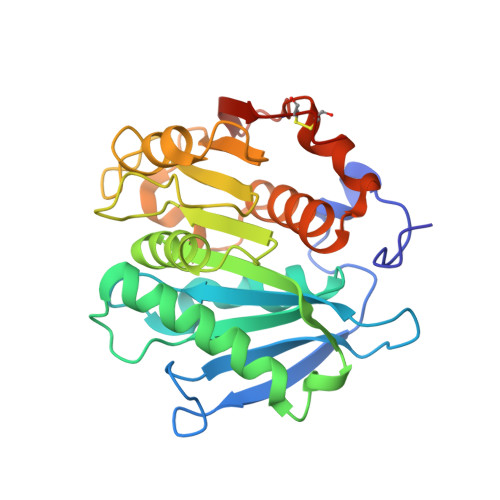Structure and function of the metagenomic plastic-degrading polyester hydrolase PHL7 bound to its product.
Richter, P.K., Blazquez-Sanchez, P., Zhao, Z., Engelberger, F., Wiebeler, C., Kunze, G., Frank, R., Krinke, D., Frezzotti, E., Lihanova, Y., Falkenstein, P., Matysik, J., Zimmermann, W., Strater, N., Sonnendecker, C.(2023) Nat Commun 14: 1905-1905
- PubMed: 37019924
- DOI: https://doi.org/10.1038/s41467-023-37415-x
- Primary Citation of Related Structures:
8BRA, 8BRB - PubMed Abstract:
The recently discovered metagenomic-derived polyester hydrolase PHL7 is able to efficiently degrade amorphous polyethylene terephthalate (PET) in post-consumer plastic waste. We present the cocrystal structure of this hydrolase with its hydrolysis product terephthalic acid and elucidate the influence of 17 single mutations on the PET-hydrolytic activity and thermal stability of PHL7. The substrate-binding mode of terephthalic acid is similar to that of the thermophilic polyester hydrolase LCC and deviates from the mesophilic IsPETase. The subsite I modifications L93F and Q95Y, derived from LCC, increased the thermal stability, while exchange of H185S, derived from IsPETase, reduced the stability of PHL7. The subsite II residue H130 is suggested to represent an adaptation for high thermal stability, whereas L210 emerged as the main contributor to the observed high PET-hydrolytic activity. Variant L210T showed significantly higher activity, achieving a degradation rate of 20 µm h -1 with amorphous PET films.
- Institute of Bioanalytical Chemistry, Centre for Biotechnology and Biomedicine, Leipzig University, Leipzig, Germany.
Organizational Affiliation:


















